-

Aggressive Tax Avoidance Scheme: The Emergence of the Continuous Distortion of the Fine Line Between Tax Avoidance and Tax Evasion
0₦2,500.00Isaiah Akano in his article, Aggressive Tax Avoidance Scheme: The Emergence of the Continuous Distortion of the Fine Line Between Tax Avoidance and Tax Evasion, explores the thin line between Tax Avoidance and Tax Evasion. Tax is one of the major sources of revenue of the government in Nigeria. As a matter of fact, at the inception of the year 2024, the Federal Government tasked the Federal Inland Revenue Service to generate a whopping sum of N19.4 trillion which amounts to about sixty percent increase from the sum of N12.3 trillion generated by it in 2023 in a bid to raise the overall government revenue as a percentage of the Gross Domestic Product (GDP) to 25% . The revenues are meant to be generated from individuals, companies and other legal entities through tax. Hence, there is a need for citizens and corporate bodies to arrange their affairs in such a way that they can attract a minimal tax, especially in view of the harsh economic condition in the country, high inflation rate, the weak value of the naira and high interest rate on loans which most businesses resorted to, as their major source of capital. Tax lawyers, Accountants and other tax consultants had at different times proffered different ‘tax avoidance schemes’ to their clients. Some of the Schemes are aggressive and complex in nature and there are instances wherein they were eventually interpreted by the Court to amounting to tax evasion. Akano seeks to take a critical look at the line of differences between tax avoidance and tax evasion and also discuss the continuous distortion of same as a result of the advent of aggressive tax avoidance schemes in recent years.
-

A “Deeper Dive”: The New Deduction of Tax at Source (Withholding) Regulations, 2024
0₦2,500.00Stephen Arubike and Adeyinka Adeoye in their article, A “Deeper Dive”: The New Deduction of Tax at Source (Withholding) Regulations, 2024, provide a comprehensive analysis of the Deduction of Tax at Source (Withholding) Regulations, 2024 (the “Regulations”), issued by Nigeria’s Minister of Finance and the Coordinating Minister of the Economy. Effective from January 1, 2025, the Regulations replace previous regulations on the subject, introduce several significant changes to the country’s withholding tax (WHT) regime. Key provisions include adjustments to applicable tax rates, expanded coverage of taxable entities, and a new emphasis on taxpayer identification numbers (TINs) to drive compliance. Arubike and Adeoye also address critical legal concerns raised by the Regulations, including conflicts with primary statutes, overreach in the Minister’s authority, and the unfair imposition of penalties on non-resident companies. While the Regulations aim to simplify WHT processes, reduce tax burdens on small businesses, and enhance tax compliance, several ambiguities and issues remain, particularly regarding non-resident taxation and penalties for non-compliance. Arubike and Adeoye conclude by discussing the transition period and its potential implications, as well as the need for further clarification on certain provisions to ensure fairness and legal consistency in implementing the Regulations.
-

Value Added Tax on Real Estate Lease Transactions: Connecting the Dots
0₦2,500.00In their article, Value Added Tax on Real Estate Lease Transactions: Connecting the Dots, Stephen Arubike and Utonwa Onwumelu tackle the application of Value Added Tax (VAT) to real estate lease transactions. Whilst VAT payment in Nigeria is limited to supplies of either “goods” or “services”, the law only exempts from VAT “goods” or “services” that are explicitly listed in the statute. The failure to define the terms “goods” or “services” prior to 2019 led to the conclusion in some judicial decisions that lease transactions are subject to VAT because neither lease nor interest in land is explicitly exempt from VAT. Arubike and Onwumelu aim to explore the historical context of ‘the absence of precise definition’ controversy, the rationale behind judicial interpretations, the impact of the Finance Acts 2019, 2020 and 2023 in resolving these definition issues and their practical implications.
-
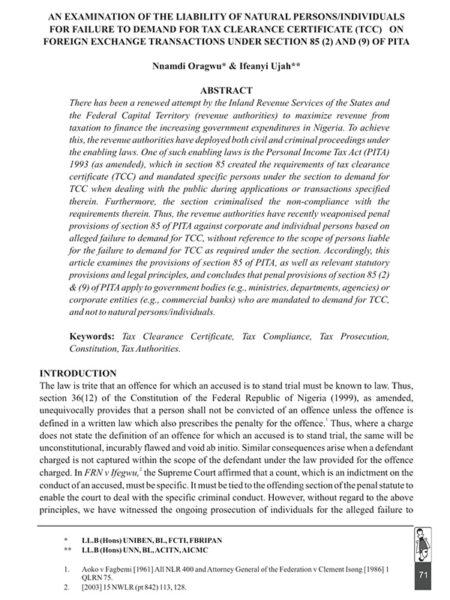
An Examination of the Liability of Natural Persons/Individuals for Failure to Demand for Tax Clearance Certificate (TCC) on Foreign Exchange Transactions under Section 85 (2) and (9) of PITA
0₦2,500.00Nnamdi Oragwu, Esq and Ifeanyi Ujah, Esq, in their article, An Examination of the Liability of Natural Persons/Individuals for Failure to Demand for Tax Clearance Certificate (TCC) on Foreign Exchange Transactions under Section 85 (2) and (9) of PITA, examine the provisions of section 85 of PITA, as well as relevant statutory provisions and legal principles, and concludes that penal provisions of section 85 (2) & (9) of PITA apply to government bodies or corporate entities who are mandated to demand for TCC, and not to natural persons/individuals. There has been a renewed attempt by the Inland Revenue Services of the States and the Federal Capital Territory (revenue authorities) to maximize revenue from taxation to finance the increasing government expenditures in Nigeria. To achieve this, the revenue authorities have deployed both civil and criminal proceedings under the enabling laws. One of such enabling laws is the Personal Income Tax Act (PITA) 1993 (as amended), which in section 85 created the requirements of tax clearance certificate (TCC) and mandated specific persons under the section to demand for TCC when dealing with the public during applications or transactions specified therein.
-
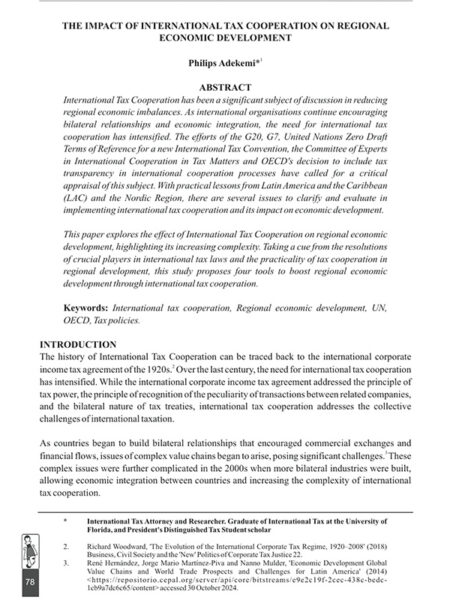
The Impact of International Tax Cooperation on Regional Economic Development
0₦2,500.00Philips Adekemi, in his article The Impact of International Tax Cooperation on Regional Economic Development, explores the effect of International Tax Cooperation on regional economic development, highlighting the increasing complexity of international tax cooperation. International Tax Cooperation has been a major subject of discussion in reducing regional economic imbalances. As international organizations continue to encourage bilateral relationships and economic integration, the need for international tax cooperation has intensified. The efforts of the G20, G7, United Nations Zero Draft Terms of Reference for a new International Tax Convention, the Committee of Experts in International Cooperation in Tax Matters and OECD’s decision to include tax transparency in international cooperation processes have called for a critical appraisal of this subject. With practical lessons from Latin America and the Caribbean (LAC) and the Nordic Region, Adeyemi examines the several issues for clarification and evaluation in the implementation of international tax cooperation and its impact on economic development. Taking a cue from the resolutions of key players in international tax laws and the practicality of tax cooperation in regional development, Adekemi proposes four tools to boost regional economic development through international tax cooperation.
-
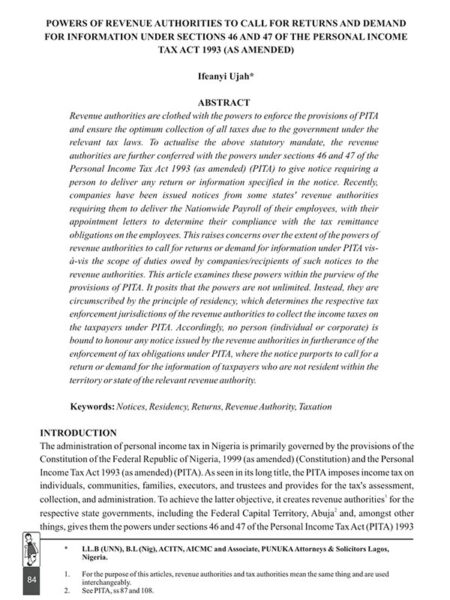
Powers of Revenue Authorities to Call for Returns and Demand for Information under Sections 46 and 47 of the Personal Income Tax Act 1993
0₦2,500.00Ifeanyi Ujah, in his article, Powers of Revenue Authorities to Call for Returns and Demand for Information under Sections 46 and 47 of the Personal Income Tax Act 1993, examines the extent and limitations on the powers of Revenue authorities to call for Returns and Demand for Information under the PITA. Revenue authorities are clothed with the powers to enforce the provisions of PITA and ensure optimum collection of all taxes due to the government under the relevant tax laws. To actualize the above statutory mandate, the revenue authorities are further conferred with the powers under sections 46 and 47 of the Personal Income Tax Act 1993 (as amended) (PITA) to give notice requiring a person to deliver any return or information specified in the notice. Recently, companies have been issued with notices from revenue authority of some states, requiring them to deliver the Nationwide Payroll of their employees, with their appointment letters for the purpose of determining their compliance with the tax remittance obligations on the employees. This raises concerns over the extent of the powers of revenue authorities to call for returns or demand for information under PITA, vis-à-vis the scope of duties owed by companies/recipients of such notices to the revenue authorities. Ujah examines these powers within the purview of the provisions of PITA. He posits that the powers are not unlimited, rather they are circumscribed by the principle of residency which determines the respective tax enforcement jurisdictions of the revenue authorities to collect the income taxes on the taxpayers under PITA. Accordingly, no person (individual or corporate) is bound to honour any notice issued by the revenue authorities in furtherance to the enforcement of tax obligations under PITA, where the notice purports to call for return or demand for the information of taxpayers who are not resident within the territory or state of the relevant revenue authority.
-
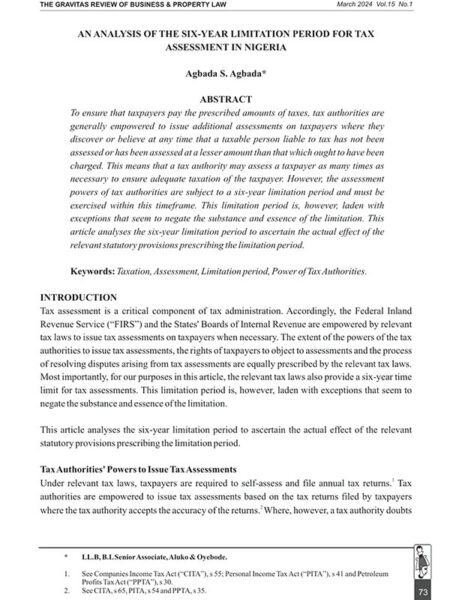
An Analysis of the Six-year Limitation Period for Tax Assessment in Nigeria
0₦2,500.00Agbada S. Agbada, in his article, An Analysis of the Six-year Limitation Period for Tax Assessment in Nigeria, examines the six-year limitation period for tax assessment in Nigeria. To ensure that the prescribed amounts of taxes are paid by taxpayers, tax authorities are generally empowered to issue additional assessments on taxpayers where they discover or are of the opinion at any time that a taxable person liable to tax has not been assessed or has been assessed at a lesser amount than that which ought to have been charged. This means that a tax authority may assess a taxpayer for as many times as may be necessary to ensure an adequate taxation of the taxpayer. However, the assessment powers of tax authorities are subject to a six-year limitation period and are required to be exercised within this timeframe. This limitation period is however laden with exceptions that seem to negate the substance and essence of the limitation. Agbada analyses the six-year limitation period with a view to ascertaining the true effect of the relevant statutory provisions prescribing the limitation period.
-
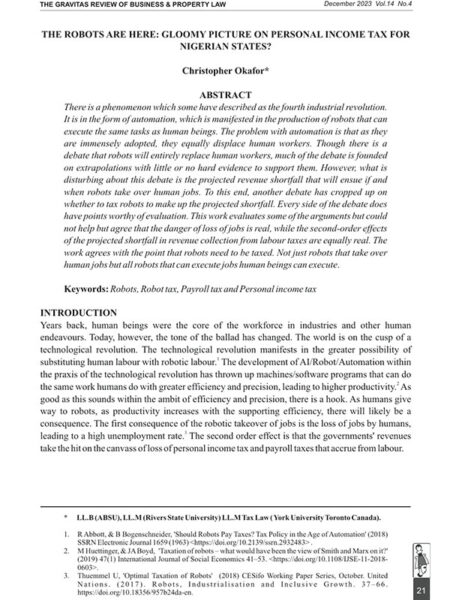
The Robots Are Here: Gloomy Picture on Personal Income Tax for Nigerian States?
0₦2,500.00Christopher Okafor Esq, in this article, The Robots Are Here: Gloomy Picture on Personal Income Tax for Nigerian States, examines the emergence of robots in the workplace with its potentiality for job losses and a reduction in taxable revenue. The emerging phenomenon which some have described as the fourth industrial revolution is in the form of automation which is manifested in the production of robots that can execute the same tasks as human beings. The problem with the automation is that as they are immensely adopted, they equally displace human workers. Though there is a debate that robots will fully replace human workers, much of the debate is founded on extrapolations with little or no hard evidence to support. However, what is disturbing about this debate is the projected revenue shortfall that will ensue if and when robots take over human jobs. To this end, another debate has cropped up on whether to tax robots to make up the projected shortfall. Every side of the debate does have points worthy of evaluation. Okafor evaluates some of the arguments but could not help but agree that the danger of loss of jobs is real, while the second order effects of projected shortfall in revenue collection from labour taxes is equally real. Okafor agrees with the point that robots need to be taxed. Not just robots that take over human jobs but all robots that can execute jobs human beings can execute.
-
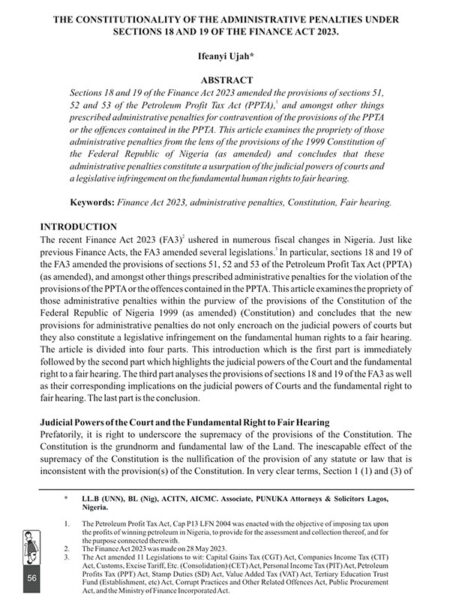
The Constitutionality of the Administrative Penalties Under Sections 18 and 19 of the Finance Act 2023
0₦2,500.00Ifeanyi Ujah, in his article The Constitutionality of the Administrative Penalties Under Sections 18 and 19 of the Finance Act 2023, examines the constitutionality of Sections 18 and 19 of the Finance Act 2023 which amended Sections 51, 52 and 53 of the Petroleum Profit Tax Act (PPTA). The article examines the propriety of those administrative penalties introduced by the amendment against the background of the 1999 Constitution of the Federal Republic of Nigeria. It concludes that these administrative penalties constitute a usurpation of the judicial powers of courts and a legislative infringement on the fundamental human rights to fair hearing.
-
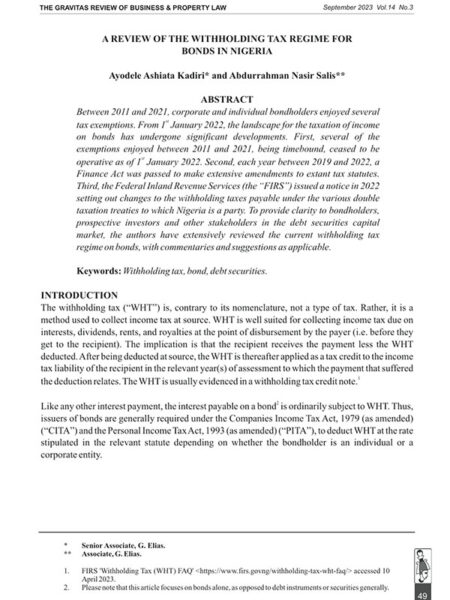
A Review of the Withholding Tax Regime for Bonds in Nigeria
0₦2,500.00Ayodele Ashiata Kadiri and Abdurrahman Nasir Salis, in their article, A Review of the Withholding Tax Regime for Bonds in Nigeria, examine the withholding tax regime for bonds in Nigeria. They underscore the state of tax exemptions for bondholder between 2011 and 2021. However, from 1st January 2022, the landscape for the taxation of income on bonds has undergone significant developments. First, a number of the exemptions enjoyed between 2011 and 2021, being time bound, ceased to be operative as of 1st January 2022. Second, each year between 2019 and 2022, a Finance Act was passed to make extensive amendments to extant tax statutes. Third, the Federal Inland Revenue Services (the “FIRS”) issued a notice in 2022 setting out changes to the withholding taxes payable under the various double taxation treaties which Nigeria is a party to. In order to provide clarity to bondholders, prospective investors and other stakeholders in the debt securities capital market, the authors have extensively reviewed the current withholding tax regime on bonds, with commentaries and suggestions as applicable.
-
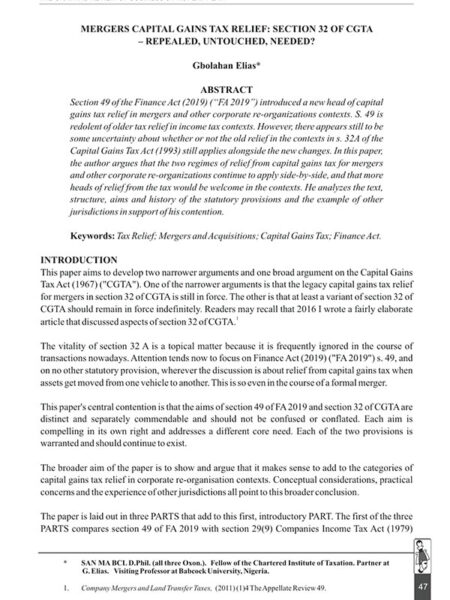
Mergers Capital Gains Tax Relief: CGTA Section 32A — Repealed, Untouched, Needed?
0₦2,500.00Professor Gbolahan Elias, SAN, Principal G.E. Elias & Co. in his article, Mergers Capital Gains Tax Relief: CGTA Section 32A — Repealed, Untouched, Needed? revisits the issue of Capital Gains Tax Reliefs in mergers and acquisitions. He explains the ambit of Section 49 of the Finance Act (2019) (“FA 2019”) which introduced a new head of capital gains tax relief in mergers and other corporate re-organizations contexts. He compares the provision with section 49 in the 1993 Capital Gains Tax Act and identifies ambiguity about whether or not the old relief in the contexts in Section 32A of the Capital Gains Tax Act (1993) still applies alongside the new changes. Professor Elias argues that the two regimes of relief from capital gains tax for mergers and other corporate re-organizations continue to apply side-by-side, and that more heads of relief from the tax would be welcomed. He analyzes the text, structure, aims and history of the statutory provisions and the example of other jurisdictions in support of his contention.
-
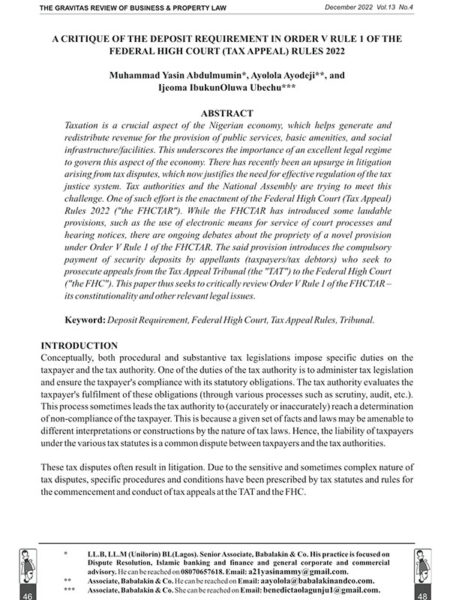
A Critique of the Deposit Requirement in Order V Rule 1 of the Federal High Court (Tax Appeal) Rules, 2022
0₦2,500.00Muhammad Abdulmumin, Ayolola Ayodeji and Ijeoma Ubechu, all of Babalakin & Co, in their article, A Critique of the Deposit Requirement in Order V Rule 1 of the Federal High Court (Tax Appeal) Rules, 2022, examine the provision of the Federal High Court (Tax Appeal) Rules 2022 (the FHCTAR) which introduces the compulsory payment of security deposits by appellants (taxpayers/tax debtors) who seek to prosecute appeals from the Tax Appeal Tribunal to the Federal High Court. Abdulmumin et al in their brilliant article, critically review Order V Rule 1 of the FHCTAR, its constitutionality, and other relevant legal issues.
The Gravitas Review of Business & Property Law
